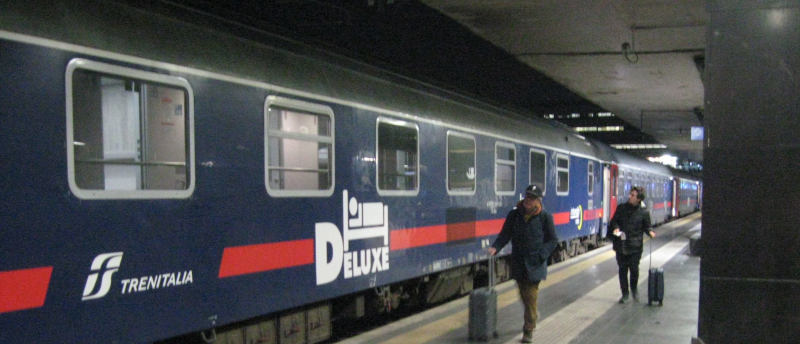
At the end of this day: I have reached my sleeper train from Roma Termini to Siracusa.
A year ago I reported on my train journey from Massachussetts to Arizona. That journey took me to a conference that's part of a series. The next installment of this conference series will take place on Malta starting Sunday, and again I plan to get there without leaving the ground, at least if you count ferries as being on the ground. While I will happily admit this may not be quite as exciting as getting through Texas, given the nice feedback I got on the Tucson posts I will write another travelogue on this tour.
“Not quite as exciting” certainly applies in that I did not start from Boston's South Station but, at least in spirit, from Dossenheim's OEG-Bahnhof, which, although about as busy, has a lot less cosmopolitan air around it than the South Station. To make up for the lack of that sort of excitement, at least the OEG plan did not work out as I had hoped (read on to learn in what sense).
“Not quite as exciting” also seems a particularly friendly understatement right now, as I sit in the boring old RE73 to Karlsruhe together with about a hundred doom-scrolling commuters and a surprisingly large number of passengers just staring out of the window into the plain of the Upper Rhine Valley.
Of course I have taken that train quite a few times before (not to mention all the fun I had on its predecessors and alternatives; there is the apt German idiom of “das Leben in vollen Zügen genießen”, which you can read as “enjoy life to the fullest extent” – or “in full trains”). But frankly, it was that part of the journey that worried me most, because Deutsche Bahn has let me down on that relation quite a bit too often, as when the train had to reboot in February 2023 and I missed a TGV to Paris in Karlsruhe.
Off to a bad start (8:20)
Unsurprisingly, my worries were absolutely justified. Except this time the letdown did not come from Deutsche Bahn, as I am sitting quite peacefully in that RE73 to Karlsruhe right now, and the traun is even roughly on time.
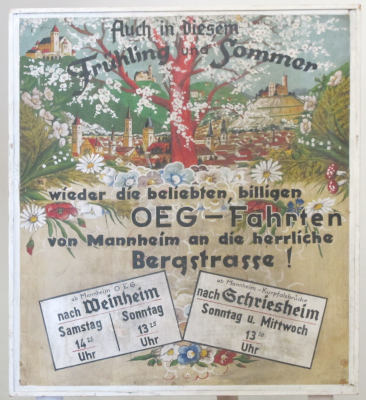
This is how I would have liked to take the first leg of my Malta tour: Ride the OEG along the “splendid” Bergstraße. Spoiler: it did not work out.
No, it was departing from Dossenheim (where I live) that turned out overly exciting. I had hoped to ride the tram, still affectionally called the OEG (see these 2023 considerations for why these affections might be misplaced) to Heidelberg main station, which is a bit less than 30 minutes.
Except of course if no train runs. Which indeed started to become a worrying issue after a few minutes of waiting, and the fact that the fellow passengers that had accumulated on the platform were about enough to fill half a train was reassuring and unnerving at the same time: if people stand packed in the car, would I still want to squeeze in with my large backpack?
Mind you, they have a display showing the next departures at that tram station. It was entertaining to watch, too, when the line 5 (that's the OEG) and the line 25 (that would have taken an even faster route to the main station) both were announed to arrive within one minute. Each update saw one or the other in the lead, taking turns. After a while, there was even the occasional “immediately” in the mix of ETAs. I had the displeasure of watching all that for more minutes than I care to remember.
Partly, it was bad judgement on my end as well. They had a marquee running on the display that, once I bothered to step close enough to read it, said “There's a power outage[1] in Dossenheim Süd. Expect severe delays on lines 5 and 25”. Of course, it might have been nice if they had factored in these “expectations” themselves and published realistic arrival estimates rather than “in one minute”. Still: Once I had read that, I decided I probably would miss my first train and thus quite likely the night train in Rome if I kept hoping for the tram's arrival, be it in one minute or the OEG flavour of “immediate”.
Thus, I hurried back to my home, where there is a bicycle for emergencies like that, some poor thing that one can leave at the main station for two weeks without much worry: There's probably nobody who would bother to steal it. This is how my means of transportation for the first leg of my Malta tour came to look like this:
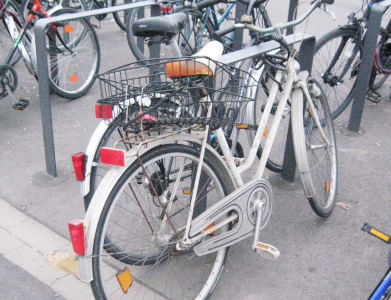
And so much for a peaceful and dignified farewell.
Interrail (9:30)
Well, RE73 made Karlsruhe in time. Generously so, because ECE 151 to Milano had 15 minutes of delay there (reason given: “emergency medical action”). I have an hour of buffer in Milano [later correction: more than two, actually], so I am not worried yet.
I used the extra time to fill out my Interrail pass at the station:
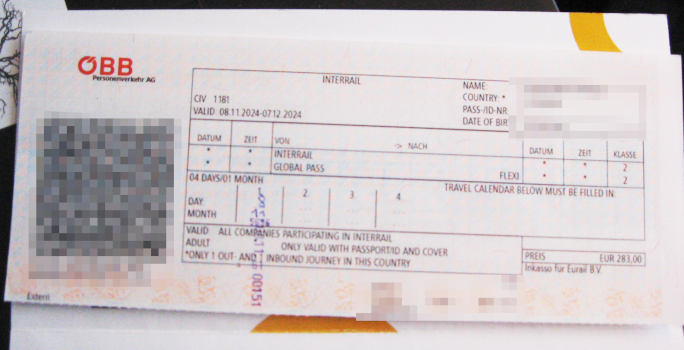
Yes, I'm doing Interrail again! After all these years! That choice was, I believe wisely, taken by Gleisnost, a travel agent in Freiburg that has evolved out of a grassroots activist group and now specialises in figuring out ways to get from A to B without having to go through annoying “security” scans at airports (not to mention emitting extra helpings of CO₂ and polluting large areas with jet noise).
I am particularly grateful to that activist group because back in the 1970ies or 1980ies, they saved the Höllentalbahn, a wonderful railway going from Freiburg into the Schwarzwald through an extremely scenic ravine that Deutsche Bundesbahn had planned to shut down back then.
Their commercial successors have been a pleasure to work with, I have to say, and I trust they have made sure that the price difference to a reasonable flight remains small enough to prevent haemorrhages on the side of my university's administration when I hand in my expense claims (and yes, I am dutifully doing exciting astronomy work when not writing this blog post).
ECE 151 is a swiss train today; charming announcements with a Swiss toning.
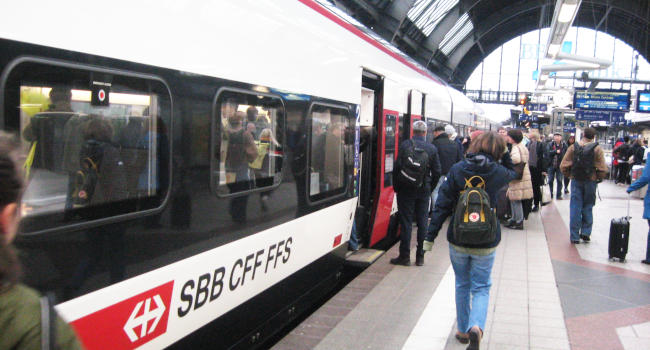
Except: Oh dear, on the on-board wifi has a captive portal that immediately does a 500 Internal Server Error with a webkit browser.
Why are these things always written by people incapable of producing browser-independent code? Or at least code failing in understandable ways? But then this is a particularly bad one: They actually require you to enter a phone number and will then send you an access token. Oh dear.
The only places I've seen this pattern in before are Russia and China (where they force the access codes to be local on top, so I'll have to give SBB they don't do that yet). Pleaseplease, if you're planning some public wifi or are asked to implement software for this kind of thing: never even think of annoyances and privacy breaches like that. There's absolutely no reason to not just let people into your wifi to begin with. And there's many reasons not to annoy them with your javascript, ads, and whatnot, but requiring them to carry and operate mobile phones and processing their numbers is the Mortal Sin.
Also, reliability will go up a lot if you don't have complicated web pages blocking access to the internet. Out of curiosity, I still tried SBB's little madness. This time. I'll again give SBB that it at least worked.
With half an ear I notice that the two Americans sitting next to me discuss this week's election results. It's reassuring there's quite a bit of “batshit crazy” in their dialogue. Let me claim here that people you meet in trains are much more likely to be reasonable than people you could meet if driving cars weren't such an autistic pastime in the first place.
Beyond Basel (11:40)
We have just left Basel's Swiss station. Against all my expectations towards the reliable SBB, the train has gained another 15 minutes of delay there. A charming voice, this time with a rather heavy Swiss accent, somewhat quizzically mentioned “technical problems”, but at least gave regular status updates culminating in “we will be leaving in two minutes”.
So we did, and we are now rolling through a long tunnel that replaced a long stretch of railway-lining industry as we pulled out of the Basel agglomeration. So we are in Switzerland. What would you expect if not tunnels?
Ummmm… there is one thing I did not expect in Switzerland: a queue in front of the toilet, and that while the train is not full at all any more. Indeed, it seems there is just one toilet for the entire car, and last time I tried, three people were queued up for it. Dear SBB: I truly believe I'm not be only one who thinks a single toilet for a long-distance car is a bit stingy.
On the plus side, they clearly indicate when that toilet is available in a place well visible from the entire car:

Also on the plus side, the sliding door of the toilet cabin moves fast if necessary. That's a welcome change from some of the DB's designs, where opening and closing these doors takes 15 seconds each. That can seem a very long time if you had to spend too much time in the toilet queue…
Ah, and the conductor just came in with a hearty “Grüezi mitenand!”. Charming!
Gotthard-Basistunnel (13:40)
We have been climbing for quite a while now, mostly along fairly scenic lakes: The Zürichsee and the Vierwaldstätter See. This is still a seriously nice train ride, although it apparently never makes the line of 500 meters above the sea level.
But now we are speeding (160 km/h according to the onboard info) through the new Gotthard tunnel, 57 km of blackness. There is no light outside our windows, not even, for all I can tell, some emergency beacons. I have tried to capture what you see outside:

That's it, really. This is an unretouched photo.
And still all passengers are completely relaxed while rushing through this endless pit:
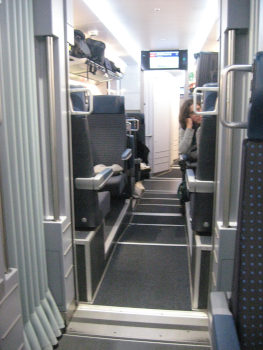
As you regard that image, keep in mind that there could be almost 2.5 kilometres of solid rock above these people now. And that, if they for some reason had to walk into the open from where they are, in the midst of the Gotthard-Basistunnel, they would walk the better part of a day.
Incidentally, quite a bit before we disappeared beneath the rock, there was this scene somewhere near Schwyz that somehow struck me as essential Switzerland:
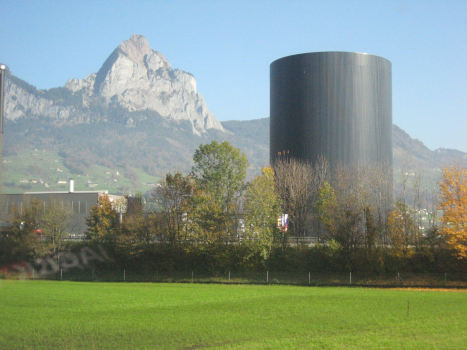
Announcements in Italian first (14:10)
We are through the Gotthard, and sure enough: the announcement that we are approaching Bellinzona came in Italian first, and the German announcement had a clear Italian rather than Swiss accent.
Hm. The old Gotthard train had many drawbacks, including that I would usually be sick by the time we had reached the tunnel entrance. But it did give me more of a feeling of crossing into the greater Mediterranean than just those twenty minutes of blackness that the Gotthard Basistunnel is.
Towards Milano (15:30)
A while ago, we pulled along Lago di Lugano and had a view of a fairly garish construct on the other side of the lake:
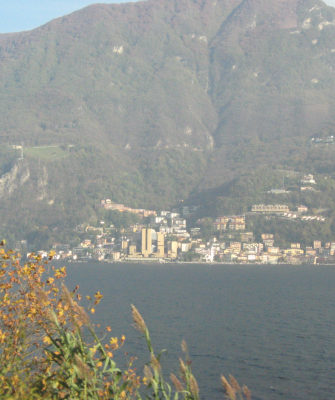
I think the ugly concrete block in this photo's centre must be the gambling palace of Campione, an Italian exclave within Switzerland that I had not heard of before. If it is, then let me proclaim here to that building's architect: Mario Botta, you shouldn't have done this.
Meanwhile, we had a fairly long stop in Chiasso; this must have been 20 minutes, and there were border guards passing through the train. That does not seem quite right for a Schengen border. I cannot remember whether Chiasso has been a longer stop before Italy's current … post-fascist (is that the hate-speech-free term?) government. If this extra check indeed is new: are they really hoping to catch refugees from Switzerland flooding into Italy?
Nachtrag (2024-11-19)
I note in passing that entering Switzerland on the way back from Malta, the stop was rather short and no border guards came through the train.
I have also done some extra research on the toilet situation. The one-toilet-per-car thing is special to my car and is because it's an inclusive toilet. Somewhat flamboyantly, the toilets in other cars are exclusive. There are three of them: One is a urinal and has a male icon guarding it, another has a female icon, and the last is a normal train toilet with both a male and a female icon. Have I ever seen gender-separated toilets on a train before? I'm not sure, but I don't think so.
Oh, and a pro tip for these toilets: When the flush button blinks in green, you probably want to dam it up for a bit, as you cannot flush then. But at least for me the button eventually went back to a stable green light, and then the toilet works as flawlessly as my stereotypes about Switzerland had made me expect.
Be that as it may: we're rolling into Milano, and the one thing I will not miss from this train is the wifi. Not only was it encumbered with the captive portal that was a pain on each reconnection, sometimes sporting the 500 HTTP responses even in the firefox. It also was surprisingly broken during operation, with a lot of spurious lost connections. Weird. SBB, you can do better than that.
Transferring in Milano (17:30)
Shiver my timbers. The wifi in the main station of Milano is of the Sino-Russian type as well, the one that won't work unless you give a telephone number that belongs to a phone that is logged into the network. Here, at least, this sort of practice nicely meshes with the station's architecture:
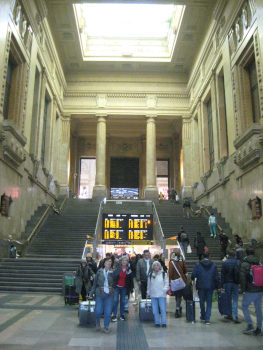
Sure enough, the dedicatory inscription (including the year 1930) confirms the suspicion that the atmosphere of that room impressed on me: This thing was designed by the inventors of the term “fascism”. Ah well.
The Gleisnost people were thoughtful enough to plan for a two-hour break here, which I spent in part foraging for food outside of the station. This was not an easy decision, since Milano has checkpoints in front of the platforms, too, which notionally require you to scan some QR code to get back in. Since I'm travelling with an Interrail pass, I was concerned that scanning procedure might turn out to be a major hassle.
It did not. Of course, the machine did not accept the QR code they had printed on the back of the pass, although its explanation said it is supposed to work in France, Italy, and the Netherlands (do they all have these stupid barriers in train stations by now? Sigh!). But vaguely waving the pass in the rough direction of a guy guarding a manual gate was enough to get me in.
Whoever thought these barriers are a good idea: Please think again. You're really only annoying the ordinary train riders. If someone really wants to do whatever it is you don't want them to (which, by the way, would be what?), they clearly can even with these stupid things.
Wait. I'm not done ranting about Milano Centrale: Someone thought it was a good idea to remove almost all the benches from the platforms. Ummm… why? You see, I had expected trouble getting through the barrier and thus have passed it with quite a bit of contingency buffer. Making people similarly concerned stand for half an hour or so is not likely to improve their moods, not to mention their regard for the checkpoints.
If you ever find ourself in the same situation in Milano Centrale, here's a pro tip: There are a few seats at the very right end of the platform hall.
Fortunately, I will soon be leaving this unfriendly place. Oh, and I like the attention to detail the Gleisnost folks show. You see, unfortunately all the fast trains in Italy require a reservation (ugh!); but at least Gleisnost reserved window seats throughout. Sure, it will be dark on the way to Rome. But it's still nice if you see the occasional light shimmer in the dark behind the window.
A stampede of trolleys (18:15)
Ha! I am on the train to Rome. But before succeding in boarding it, I again lived through the agony of having no idea where exactly that would happen until a few minutes before departure.
I give you this is probably a rather German sentiment, but I like it if I can walk to the departure platform at my leisure, sit down there and just wait until the train arrives. Even in large train stations in Germany, that used to be possible because Deutsche Bahn told you weeks in advance which platform your train would arrive on. Of course, in the generalised chaos that the privatised German rail has become, you are lucky if a given train runs at all, and you stop hoping for concrete locations in space-time.
The Italian practice of announcing platforms at the last minute of course also explains why there are no benches on the platforms; I had totally forgotten about that fairly obvious reason in my rant above. So, ok, fair enough. But then what about benches where everyone stares at the departure display, hoping for some shred of information on where to go next:
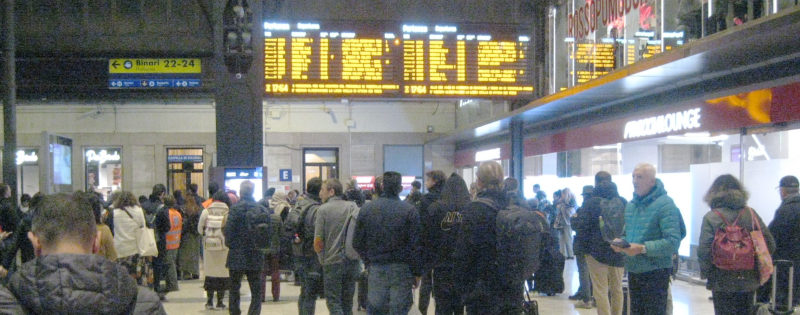
My train only had its platform announced less than 10 minutes before departure, and the resulting stampede of trolley-pulling people not wanting to be left behind and clogging the entrance to the platform right at the moment when the arriving passengers wanted to leave did not make me reconsider my skepticism for last-minute-platforms.
As hard as it is for someone who has largely given up on DB to say this: I think fixed platforms is one thing that Deutsche Bahn does right. Or at least tries to do right. But then: While I watched, there was only one train with a delay in Milano, and that delay was just 5 minutes. Kudos to FS for functioning so much better than DB.
Frecciarossa (20:30)
We have passed Firenze about half an hour ago, and in a bit more than an hour, the train I am on will arrive in Roma Termini. It's a fast train, this Frecciarossa, going 250 km/h at the moment, and keeping that pace for much longer distances than I am used to from Deutsche Bahn's ICEs. Until Firenze, it has also been quite full, where most passengers appeared to be, how shall I put this, business-like.
They also wore a lot more ties than I have ever seen in a DB train. There were more computers with keyboards, too, if I disregard the times I was travelling in cars full of nerds on their way to a Chaos Communication Congress. Fortunately, there is one socket per seat on the Frecciarosso (which is something I think even the most recent ICE has not managed to provide).
Quite a few of these people actually had not called it a day by that time (7 pm, say). I could not resist an occasional glance at my seat neighbour's screen, and he was hacking javascript (but fairly modern Javascript by my standards, as in for (const item of iterable) and such) for some video watching platform and tried to figure out some rate adaptation tech.
Given the classy touch of cabin and passengers, I was somewhat disappointed in the dining options on the train. All they have is a bar they call a cafeteria. There is no sit-down area, but they will heat a few dishes for you to carry back to your seat. None of what I saw goes much beyond finger food, though. Good thing I already had a falafel sandwich in Milano. What I got here on the train is something they call Pinsa Vegetariana:

I have to say that this tasted significantly better than in looked, but still: there go the stereotypes. When Austrian dining cars are so much nicer than their Italian counterparts (and mostly work, contrary to, say, Deutsche Bahn's dining cars), then we clearly are one step closer to post-nationalism.
Transferred in Roma (23:20)
One of the things I like most with night trains is the slow pace of boarding them. Watch the opening sequence of Murder in the Orient Express in the Ustinov rendering to get an idea. It's almost like that. You walk along the long train, taking your time to read the car numbers, exchanging a few words with the conductors and eventually enter the car that has a bed for you.
To enable hat, they announced the platform 30 minutes in advance. And hence I am, hooray, in the train that will take me to Siracusa. But that's 12 hours from now. For now, I will fall into my bed and supply photos tomorrow morning. Good night.
Read on in my account of day two.
| [1] | Just as an aside: power outage!? I think I've had a single power outage since I have moved to Dossenheim about 15 years ago. The excuses for delays seem to veer into the seriously bizarre territory recently, as when last Sunday Deutsche Bahn offered “due to measures for schedule stabilisation” as an excuse for why they had canceled a train. And of course while I was waiting in Dossenheim, three trains came out of the section with the power outage. But I will freely admit that I don't know the relation between the public grid and the power the OEG runs on. |
Zitiert in: Dossenheim to Malta: Day Two
![[RSS]](./theme/image/rss.png)